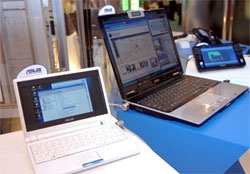The trend of high netbook configuration
Computer manufacturers are experimenting with integrating two-core Atom chips into a high-end netbook generation expected to be released this summer.
The big story in 2008 was the emergence of netbooks with sales amounting to 14 million, according to Austrian research firm DisplaySearch. But the 2008 netbooks are still the second or third computers due to the lack of a strong enough configuration to become the main computer.
This will change quickly this year as netbooks begin shipping using Intel's dual-core Atom chip. Netbooks using dual-core Atom processors such as Core 2 Duo processors can implement applications that require high processing speeds. Currently, computer manufacturers are integrating the testing of this two-core chip into new generation netbooks and other products.
 By the middle of this year, computer makers are expected to launch a new high-configuration netbook, using dual-core chips. ' 2009 will be the year of netbooks, ' said Gartner analyst Kleynhans. ' Netbooks will be small and light enough to carry around but strong enough for most people ' needs. According to Kleynhans, adding a second core will not double the capacity of netbooks but the new dual-core Atom chip will boost user performance by about 50% and bring netbooks to the reach of laptops. Common. It is expected that two-core Atom chip netbooks will appear in the summer or later this fall.
By the middle of this year, computer makers are expected to launch a new high-configuration netbook, using dual-core chips. ' 2009 will be the year of netbooks, ' said Gartner analyst Kleynhans. ' Netbooks will be small and light enough to carry around but strong enough for most people ' needs. According to Kleynhans, adding a second core will not double the capacity of netbooks but the new dual-core Atom chip will boost user performance by about 50% and bring netbooks to the reach of laptops. Common. It is expected that two-core Atom chip netbooks will appear in the summer or later this fall.
Netbook graphics processing capabilities will be improved. Nvidia has put its technology to accelerate its GeForce 9400M graphics processing into Atom processors (as it did with Apple's MacBookPro laptop). The combination of Nvidia's graphics technology will make netbooks not only surf the web, browse emails and implement simple applications that can handle heavy graphics applications, or watch high-definition movies.
Intel is not alone in pushing netbook performance. This year, AMD chip company plans to focus on microcomputer with the introduction of single-core and multi-core Athlon Neo chips. According to AMD, Neo chips will also use ATI Radeon Avivo technology to decode and display high-definition movies.
What's more, Via, the manufacturer of the C7 processor that HP uses in the Mini-Note 2133 netbook, is also redesigning the C7 chip into a dual-core chip. The company called the new dual-core chip, Nano, expected to be released later this year or early 2010. The single-core C7 chip was released by Via earlier this year.
However, the downside of this highly configurable netbook generation is that battery life will decrease. Netbooks using dual-core chips consume about 6 to 8 watts of power, twice the current power consumption of netbooks. Power management technology may compensate for the loss of battery life but it is certain that the time of this new generation netbook will be shorter or the battery will be bigger and heavier.